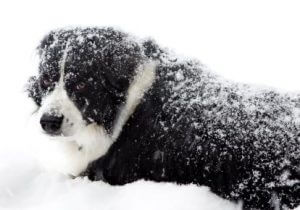26 May 2016
With the latest drop in temperature across the UK, we humans are feeling pretty chilly…but are our dogs?
Hypothermia is a medical condition where the body temperature drops to levels that are too low. Cases can be mild, moderate or severe. Newborn puppies, small breeds and elderly pets are more likely to suffer from the cold; however any dog can be at risk of developing hypothermia.
Many dog owners think hypothermia can only set in if a dog is left outside in freezing conditions for a long time; however there are hundreds of cases across the UK in the winter months and is a problem that many people expectantly face. The most common causes of hypothermia are exposure to extreme temperatures, fur being left wet/damp after swimming or a bath and shock.
Symptoms of hypothermia can include weakness, shivering, lethargy, faint heartbeat, pale gums, low blood pressure, shallow breathing, dilated pupils and a coma like state. The extent of symptoms can range depending on body temperature and duration of hypothermia.
If you suspect your dog may be in the early stages of hypothermia, there are a few things you can do to warm them up whilst getting veterinary help. Dogs needs to be actively treated until their normal body temperature returns, and must be kept still to prevent any further loss of heat or irregular heartbeat. You can wrap them in warm blankets and fill bottles with warm water and wrap in towels, place these in areas such as the armpits or groin to supply an external heat source. Dogs can show signs of discomfort when warming up, just like we get a tingling sensation they too can feel odd pains and aches so may start to itch or nibble these areas.
All cases of suspected hypothermia should be investigated by a vet, and more severe cases will need invasive core warming such as warm intravenous fluids, warm enemas and help with breathing.
Prevention is better than cure, and all dogs no matter what size, age or breed should be considered when the weather gets colder. Take shorter walks, provide a cosy jumper or coat for small and short haired breeds, add an extra blanket to their beds, and keep room temperatures mild.
